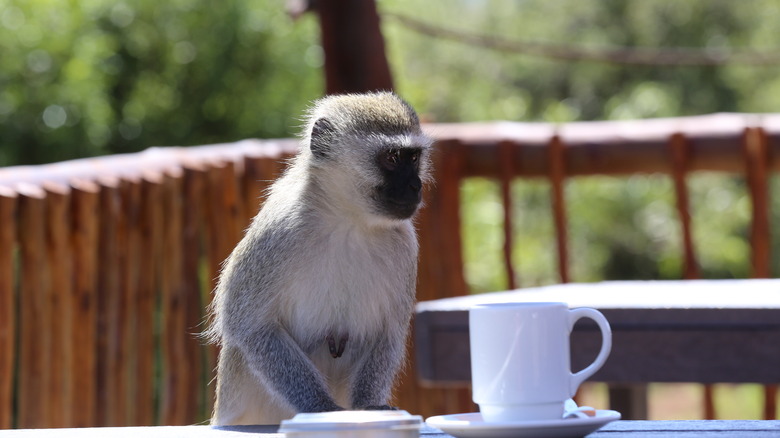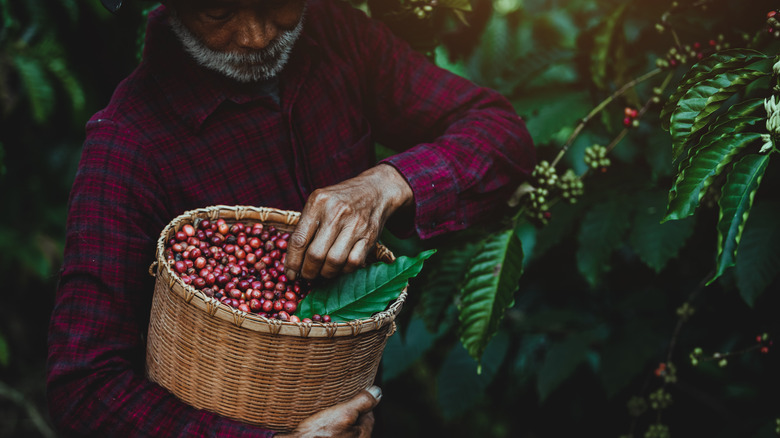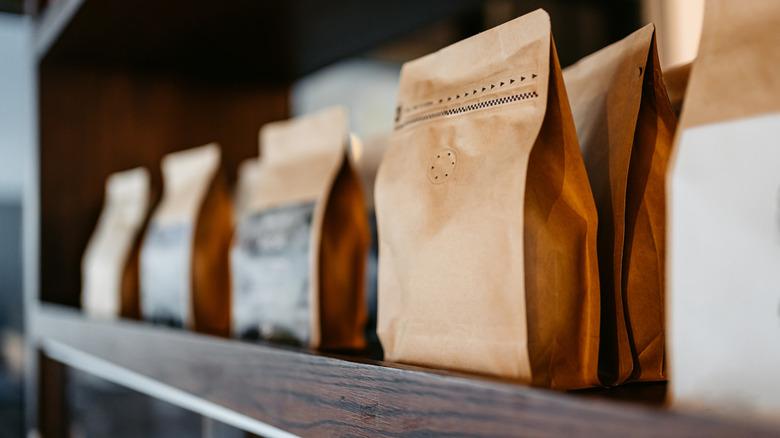The Rare Coffee Variety That's Literally Spit Out By Monkeys
If you're a connoisseur who knows how to use flavor notes, you may have heard of civet coffee, also called kopi luwak, made from coffee beans excreted by the Asian palm civet. However, that exotic coffee isn't the only type to be made with the help of animals.
Monkey coffee, also called monkey parchment coffee, is a rare type of coffee that is only cultivated in India and Taiwan with the help of Formosan rock macaques and rhesus monkeys. Unlike civet coffee, which is made from partially digested coffee beans, monkey coffee is made from chewed-up and spit-out beans. This certainly makes it a bit more palatable to the average consumer. However, you won't find monkey coffee at your local Starbucks or Dunkin', as it seems few people have tried it — that's because it's extremely hard to source.
Despite its rarity, monkey coffee is sought out by coffee lovers as a one-of-a-kind treat that boasts bold flavors that can't be replicated. Like civet coffee, it's something you probably shouldn't pass up if you get the chance to try it.
Making monkey coffee and how to drink it
Monkey parchment coffee comes from coffee farms in India and Taiwan, which are often located close to forests, where monkeys help themselves to the coffee plants. While this used to get them labeled as pests, things changed in the early 2000s. Farmers began picking up the chewed-on coffee beans and selling them.
Formosan and rhesus monkeys are drawn to ripe coffee cherries, which they chew and spit out. The thought is that the monkeys instinctively pick out the choicest ones. Workers harvest these ripe, chewed beans before washing and processing them. After the beans are dried, they often have a greyish hue, unlike the green coffee beans that most people are familiar with. When the beans have been dried out, they can be roasted like any other.
What makes monkey coffee so special is that the ripe beans are broken down from an enzyme in the monkey's saliva, which gives them a sweeter, more complex flavor profile. This includes natural flavor notes of vanilla, citrus, and chocolate. If you're lucky enough to find monkey coffee, you'll also want to learn to sniff and slurp your coffee like a professional for the best experience, avoid brewing it using a standard drip machine, and opt for a French press or moka pot instead. This will allow you to brew a richer, more flavorful cup of coffee that really lets these rare beans shine.
Buying and storing monkey coffee
Monkey parchment coffee is difficult to come by as its yield is hard to predict, not many farms specialize in it, and those that do are often only able to harvest small amounts (less than 100 pounds). Additionally, environmental factors can decrease supply even further. Because of this, not many people are fortunate enough to get their hands on a bag. Online sellers sometimes have monkey parchment coffee in stock. However, reliably purchasing it outside of India and Taiwan is tricky due to a lack of supply.
Like other types of coffee, how you store monkey coffee once you have it is important. For instance, don't store it in the bag it comes in, as this can allow for air and temperature to affect the beans, resulting in a loss of flavor. Instead, you'll want to store your beans in an airtight container located in a cool, dry place. However, if your coffee comes in a bag with a zipper closure and a vent, you can store them as is because the bag has been designed to keep beans fresh.
That said, never store monkey coffee in a refrigerator or freezer because coffee beans are sensitive to humidity and moisture. If they don't come in a stay-fresh bag, we recommend investing in a ceramic or metal container with a vacuum-sealing lid that's designed to keep coffee beans fresh. You definitely don't want to risk any of these beans losing their unique flavor.


